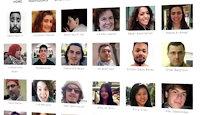Originally posted on January 19, 2010
The following is clearly at variance with not only the views of Rav Moshe Feinstein (Igors Moshe Y.D. III 43) but also R' Riskin's rebbe - Rav Yosef Ber Solveitchik
JPOST
It's no secret that during the past two years I have become seriously involved in Jewish-Christian dialogue. In fact, here at Ohr Torah Stone in Efrat we've established the Susan and Roger Hertog Center for Jewish Christian Understanding and Cooperation, and many hundreds of Christians regularly attend classes and seminars to gain a better understanding of the Jewish roots from which Christianity sprouted.[....]
Columbia Spectator 1964
Proposed Ecumenical Schema Rejected by Orthodox Rabbi
Rabbi Joseph B. Soloveitchik, a leading Orthodox Jewish theologian, told a meeting of the Barnard and Columbia Yavneh Society Monday night that the Jews should emphatically reject the proposed Schema of the Ecumnical Council dealing with the Jewish people. Dr. Soloveitchik analyzed the Schema, attempting to demonstrate that its intent was to define the Jewish faith as but a historical stage in the eventual triumph of Christianity all over the world. He implied that its aim was to facilitate Catholic proselytization among Jews. Claiming that the attitude of the Catholic Church's relationship to the Jews is that of a stance "over and against" rather than "alongside," Dr. Soloveitchik argued that each religion is and should be immutably unique and that the Jews, "doubly confronted" by human and uniquely Jewish problems, must preserve their individuality. The Schema, he said, denies the existence of Jewry as a legitimate body and treats them as a "theological interim." Rabbi Soloveitchik emphasized that while there could be no theological discussion between the faiths because each faith employs its own "mysterious language," Jews should work closely with Catholics "as two subjects working together on an object, the challenge of secularism." Lauding the efforts of the Church in the field of education, the orthodox rabbi said that many of the gains made by American Orthodox Jewry in recent years were made possible by the "trailblazing" of the Catholic Church.
Joseph B. Soloveitchik
The following is clearly at variance with not only the views of Rav Moshe Feinstein (Igors Moshe Y.D. III 43) but also R' Riskin's rebbe - Rav Yosef Ber Solveitchik
JPOST
It's no secret that during the past two years I have become seriously involved in Jewish-Christian dialogue. In fact, here at Ohr Torah Stone in Efrat we've established the Susan and Roger Hertog Center for Jewish Christian Understanding and Cooperation, and many hundreds of Christians regularly attend classes and seminars to gain a better understanding of the Jewish roots from which Christianity sprouted.[....]
Columbia Spectator 1964
Proposed Ecumenical Schema Rejected by Orthodox Rabbi
Rabbi Joseph B. Soloveitchik, a leading Orthodox Jewish theologian, told a meeting of the Barnard and Columbia Yavneh Society Monday night that the Jews should emphatically reject the proposed Schema of the Ecumnical Council dealing with the Jewish people. Dr. Soloveitchik analyzed the Schema, attempting to demonstrate that its intent was to define the Jewish faith as but a historical stage in the eventual triumph of Christianity all over the world. He implied that its aim was to facilitate Catholic proselytization among Jews. Claiming that the attitude of the Catholic Church's relationship to the Jews is that of a stance "over and against" rather than "alongside," Dr. Soloveitchik argued that each religion is and should be immutably unique and that the Jews, "doubly confronted" by human and uniquely Jewish problems, must preserve their individuality. The Schema, he said, denies the existence of Jewry as a legitimate body and treats them as a "theological interim." Rabbi Soloveitchik emphasized that while there could be no theological discussion between the faiths because each faith employs its own "mysterious language," Jews should work closely with Catholics "as two subjects working together on an object, the challenge of secularism." Lauding the efforts of the Church in the field of education, the orthodox rabbi said that many of the gains made by American Orthodox Jewry in recent years were made possible by the "trailblazing" of the Catholic Church.
Joseph B. Soloveitchik










